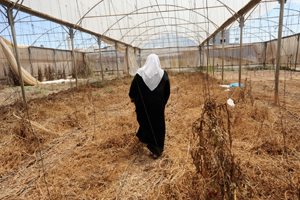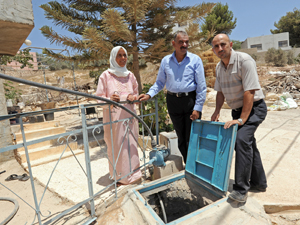
FAQUA, West Bank –– You won’t find one dripping faucet in all of the northern West Bank village of Faqua, joked village council head Amar Abu Farha with the trademark black humor Palestinians have developed over the years.
“Every drop of water is too important,” he said, laughing bitterly.
Ironically, Abu Farha noted, the name Faqua in Arabic means bubbles and refers to the numerous natural springs that once surrounded the village. Today, those water resources are under Israeli control and provide water for nearby Israeli villages such as the agricultural fields of Ma’aleh Gilboa.
Every morning when 17-year-old Lo’i Ali looks out from his family’s porch, he can see the Israeli fields being watered. Today, the land that once belonged to his family is just out of reach, separated from the village by a road and a barbed-wired section of the Israeli separation barrier.
“I feel so angry when I see (the Israelis) watering their fields. They have lots of water and we don’t have water to drink,” said Ali, who lives with his parents and three siblings in the last house of the village bordering the fencing and security road. With no running water in the village, Ali has to determine every morning whether his family has enough water in their tank for him to take a shower.
Abu Farha, 38, a veterinarian by training, said that since he was a child, he has dreamed of bringing water to the village, which now has almost 4,000 residents. He said when he was elected council head two years ago, he made it a priority.
The Near East Council of Churches-International Christian Committee has been working in Faqua and other area villages that do not have a supply of tap water to help the most vulnerable families harvest rainwater to supplement their water supply.
George Rishmawi, advocacy officer for the churches’ committee, said that since work began in the area in the mid-1990s, the committee has repaired or built 45 cisterns for Faqua. However, he said, this is only a temporary solution, because in the dry climate rainwater can be harvested only during the short winter months, and it usually lasts a family only until mid-spring.
Some cisterns suffered from leakage and from contamination because of their proximity to cesspits and had to be rebuilt completely in a different location, he said. Until the committee — part of the Middle East Council of Churches, of which the Catholic Church is a member – began working with the villagers, many of the people were unaware of the health risks they were taking with the cistern and pumped well water, he said.
In the summer months, the village families must buy water several times a month from a private well about seven miles away in the city of Jenin. The water can cost between $30-$40 per tank — a huge sum for the villagers, many of whom were day laborers in Israel and have now been left unemployed because the separation barrier makes it nearly impossible to get to their jobs. In addition to being expensive, the water is of poor quality, said Abu Farha, and the well sometimes runs dry because of the heavy demand on the water supply from all of the surrounding villages.
“As a Christian organization, we believe that allowing people free access to water will reduce tensions and the possibility of violence. This is one of our main drives,” said Rishmawi. “Access to quality water has to be separated from all political calculations.”
The 1993 Oslo Accords stipulate that the Palestinians have water rights, noted Rishmawi, though Israel has control of most of the water resources. A joint committee formed under the accords has approved connecting an abandoned water pipe to an Israeli water source, but those talks have been going on for a year.
Rishmawi noted that according to the World Health Organization, the minimum amount of water needed per capita is 39 gallons per day for domestic household use. In the summer months, most Palestinian households receive only 13-18 gallons per person per day.

Many of the village residents turned to animal husbandry and small farming when they lost their jobs, but they are hampered in these efforts as well by the shortage of water in the village, said Rishmawi.
Most worrisome, though, said Abu Farha, is the poor quality of the water, which causes stomach ailments during the summer months, especially among the young and elderly residents.
“I am a veterinarian and my wife is a teacher, and we are both aware of the health risks which come with drinking pumped well water,” said Abu Farha. “But this is the water we have to give our daughters to drink. Two days after the rainwater finished and we brought in tanked water, they started to get sick.”
If Faqua were connected to the Israeli water system, “life would have a different taste,” said Noora Ahmed, 26, a mother of three.
“The first thing I would do is get an automatic washing machine. I would give my children a bath every day,” she said.
With three young children, Ahmed does laundry two times a week and, even in the summer when they get hot and dirty from crawling around, she is able to bathe them only a few times a week because water is so expensive. And every summer her children are sick with stomach ailments from drinking tanked water.
“I like the winter because we don’t have to worry about water,” she said.
Ahmed lives with her husband’s family. They keep chickens under the house to supplement the men’s salaries. They used to run a year-round greenhouse, but in the summer months they must stop because of the high cost of watering the plants. In the winter they harvest rainwater from the roofs of the greenhouse and their house and pump it into a cistern or to tanks on the roof. They also use the water for the chickens.
“We have had problems with water since I remember,” said Ahmed’s mother-in-law, 55-year-old Afifeh Abu Hama. She recalled how, when her children were little, she would go to a public well some distance away to bring water back in a jar on her head.
Abu Hama and her daughters-in-law continue to sponge wash the floors in their house, watch carefully how much water they use for dishes and wait for the winter when there will be rainwater and they will be able to supplement their income with tomatoes from their greenhouse.
“We have gotten used to living this way,” she said bouncing her grandson on her knee and smiling at him. “I always advise my daughter-in-laws to be frugal in their use of water.”
